The future of employment in the UK - When can the UK workforce expect to be back in the office full-time?

Since 2020, the working landscape in the UK has changed drastically, with remote and hybrid jobs becoming the norm. But many companies have recently been making the switch back to full-time in-office working.
With full-time office working mandates being implemented countrywide, both employees and employers are beginning to feel the ripple effects. Workers are facing increasing commuting costs, and businesses are seeing higher overheads, particularly where utilities such as business energy are concerned.
In light of these developments, the energy experts at Bionic have explored the future of employment in the UK, forecasting when employees might return to the office full-time and examining the wider impact on both workers, employers, and various wider industries.
To gain further insight, we also surveyed 2,000 UK office workers to better understand their attitudes and feelings toward a full-time return to the office.
Key Findings and Learnings
- UK employees can expect to be back in the office full-time by the end of 2027
- 40% of Brits would be happy to return to the office full-time, with 18 to 24-year-olds being the most keen
- 67% of the UK workforce is more productive in the office than working from home
- UK office workers are spending on average £25 a day going into the office on commuting as well as food and drink
- UK employees could be spending nearly £3.5k a year on commuting alone if expected to be in the office 5 days a week
- 40% of UK employers have changed their expectations around the number of days in the office in the last year
- A full-time return to the office could cost businesses on average £5.6K a month
- Milton Keynes has the most empty office spaces in the UK (13 per 10,000 people)
All UK employees can expect to be back in the office full-time by 2027
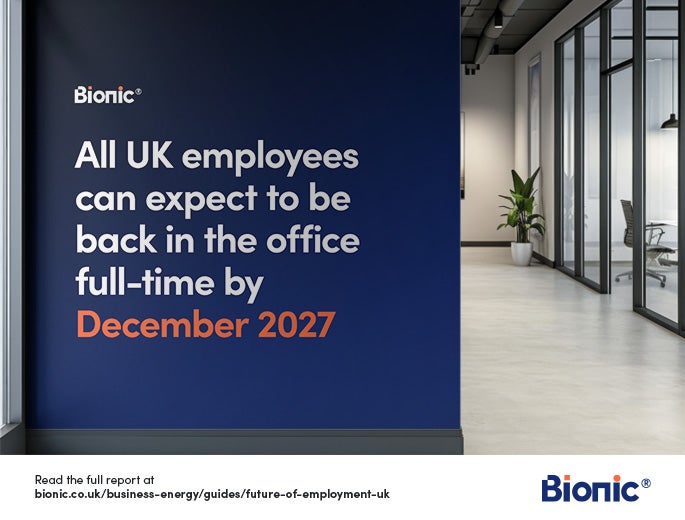
According to our data, currently, the average UK employee is required to work in the office 3.5 days per week.
However, a shift back to the office full-time is underway, with major companies like JP Morgan, Amazon, ASDA, and Boots increasing in-office requirements over the past year.
To better understand this trend, we analysed Google search data to forecast when full-time office work could become the norm again in the UK.
We looked at the search term, “working from home jobs,” to see when search interest would drop off completely and hit zero. This projection indicated the precise data when remote and hybrid work wouldn’t be standard practice in the UK.
Based on our analysis, we predict that remote and hybrid work will no longer be the standard by 19th December 2027, with all UK employees expected to return to the office full-time by that date.
40% of UK office workers would be happy to return to the office full-time
The end of remote working may not be as negatively received as thought. 40% of UK office workers feel positive about the potential of a full-time return to the office, with 1 in 6 respondents claiming that their ideal working pattern would be working in the office 5 days a week.
50% of Gen Z feel positive about the full-time office return
Out of all of the age groups, Gen Z are leading the charge for full-time in-office working.
50% of those aged between 18-24 state that they would be happy to return to the office full-time, and 23% of that same group also say that their ideal working pattern would be 5 days in the office.
The benefits of a full-time return to the office
| Ranking | Reason for Full-Time Return to the Office | % of Respondents |
| 1 = | Missing the social side of office working life | 14% |
| 1 = | Easier in-person communication | 14% |
| 3 | Feeling more motivated in the office | 13% |
| 4 | Too many distractions at home | 12% |
| 5 | Feeling isolated due to working remotely | 11% |
The top two reasons employees state for wanting to return to the office full-time are: missing the social side of office life (14%) and the added ease of in-person communication (14%).
13% of respondents feel more motivated in the office in comparison to working from home. In line with this, 12% of respondents claim that there are too many distractions at home while working. 11% also claim that they feel isolated when working remotely.
67% of people are more productive in the office than at home
One of the main reasons employees state for wanting to return to the office full-time is productivity levels. Despite Brits loving their home comforts, 67% of people admit that they feel more productive in the office rather than when working from home.
40% of UK employees feel very negative about a full-time return to the office
While many working Brits generally feel positive about a full-time return to the office, a significant portion feel strongly against it.
40% of UK office workers say that they feel very negative about a full-time return to the office, with over-45s being the least keen to let go of their hybrid and remote working schedules.
69% of 45 to 54-year-olds claim to feel negative or very negative about the idea, and a further 28% of them would prefer to be completely remote.
1 in 4 people would consider looking for a new job if they were made to go into the office full-time
Before changing any working from home rules, employers should consider the ramifications it could have on their workforce, as 1 in 4 UK office workers claim that they would consider looking for a new job if they were forced to go into the office full-time.
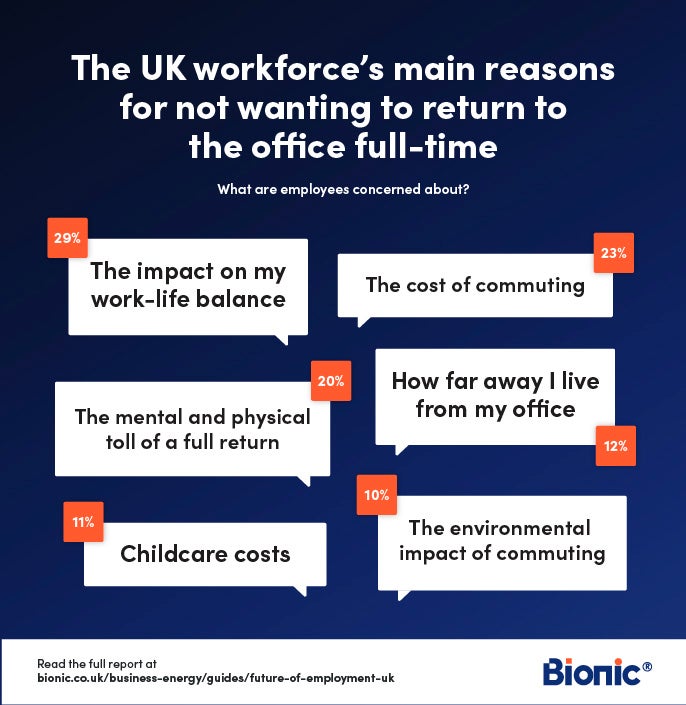
When asked why, 29% say their main concern is the impact it would have on their work-life balance, and 20% are worried about the mental and physical toll this could have.
1 in 10 of all employees are worried about the cost of childcare
Childcare costs are a significant concern among those facing a potential full-time return to the office, with 1 in 10 UK office workers highlighting it as a key issue. This concern is especially pronounced among workers aged 34 to 44, with 17% in this age group citing childcare costs as a major challenge.
According to the OECD (Organisation for Economic Co-operation and Development), the UK has the fourth-highest childcare cost in the world, with net childcare costs currently costing an average of £62 a day.
If a full-time office return were to come into place, parents, on average, could be hit with a £16,120 bill per year in childcare fees.
UK employees are spending on average £25 a day going into the office
With the introduction of hybrid working, the burden that commuting and buying lunch on the go has put on our wallets has been significantly reduced.
However, a day in the office still costs UK office workers an average of £24.92, inclusive of £5.97 for commuting and £15.52 for lunch. With a full-time return to the office on the horizon, this could amount to an average of £124.60 per week for many Brits - £6,479.20 a year!
The most expensive places to work in the UK
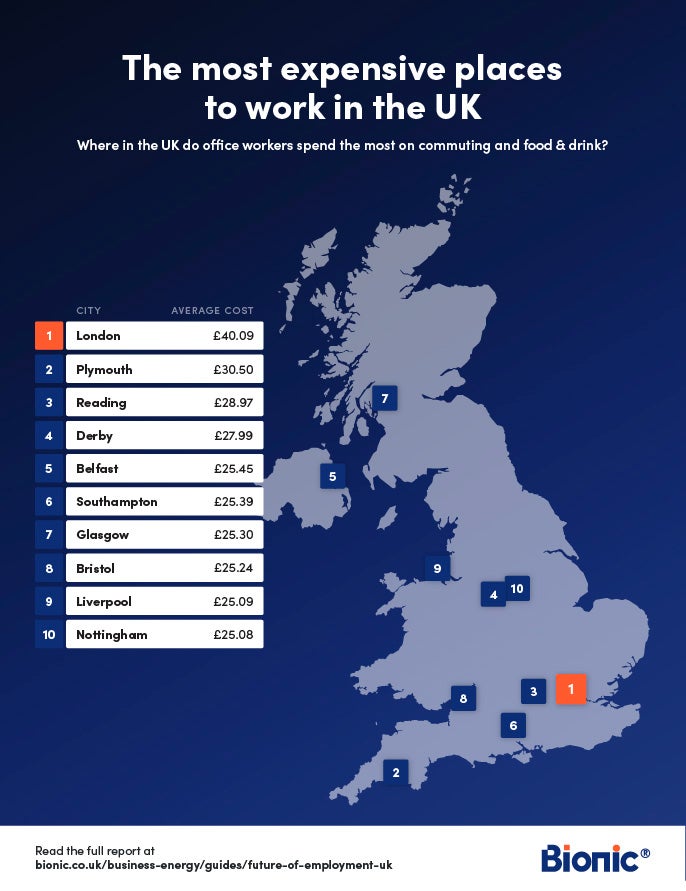
| Rank | UK Cities | Average Cost of a Coffee | Cost of Public Transport | Average Cost of Lunch | Total Cost |
| 1 | London | £3.79 | £16.30 | £20.00 | £40.09 |
| 2 | Plymouth | £3.50 | £7.00 | £20.00 | £30.50 |
| 3 | Reading | £3.57 | £5.40 | £20.00 | £28.97 |
| 4 | Derby | £3.69 | £5.80 | £18.50 | £27.99 |
| 5 | Belfast | £3.45 | £5.00 | £17.00 | £25.45 |
| 6 | Southampton | £3.69 | £4.20 | £17.50 | £25.39 |
| 7 | Glasgow | £3.60 | £6.70 | £15.00 | £25.30 |
| 8 | Bristol | £3.74 | £6.50 | £15.00 | £25.24 |
| 9 | Liverpool | £3.39 | £5.70 | £16.00 | £25.09 |
| 10 | Nottingham | £3.38 | £6.70 | £15.00 | £25.08 |
Outside of London, office workers in Plymouth are spending the most money on coming into the office
Outside of London, office workers in Plymouth spend the most money when working in the office, thanks to the city's pricey public transport and lunch options.
Plymouth workers can expect to pay an average of £20 a day for lunch, putting the city in the same cost bracket as London. Commuting adds another £7 per day, further driving up expenses.
When looking at the South West as a whole, commuters can expect to pay an overall average of £20.40 a day when working in the office.
UK employees could be spending from £3.5k a year on commuting alone if expected to be in the office 5 days a week
When asked about a full-time office return, 23% of the UK workforce say that they are concerned about the cost of commuting, which comes as no surprise when, according to our survey results, commuting costs an average of £13.70 a day for UK office workers.
If an employee were to work 5 days a week in the office, this would leave them spending £3.5k of their own paycheck per year on commuting alone.
A pre-work coffee costs UK office workers on average £3.43
With 98 million cups of coffee consumed each day in the UK, it’s clear we’re a nation of caffeine lovers; however, this daily habit doesn’t come cheap, with Brits' pre-work coffee fix costing them £3.43 a day, totalling £16.70 a week - £868.40 a year!
Edinburgh was found to be the most expensive place for coffee lovers, with the average cup costing £3.89 - this means Edinburgh office workers have to pay 48% more than the cheapest cup, which can be found in Blackpool at £2.62 a cup.
Buying lunch while in the office is costing employees £15.52 a day
According to our survey data, 77% of the UK workforce would rather buy their lunch than bring in food from home when they are working in the office.
As more people spend an increased amount of time at their office desks, it is likely that restaurants, cafes, and food-to-go outlets will find themselves busier, especially since Google searches for ‘cafe near me within 1 mile’ have increased by 171% over the past year, and on average, each month there are 71,000 Google searches for ‘lunch spots near me’.
To help narrow down the search for the perfect lunch spot, at Bionic, we analysed Google reviews data along with social search data to see which are the most popular cafes and coffee shops across major UK cities.
| Rank | City | Spot | Number of Google Reviews | Google Rating | Google Search Volume | TikTok Search Volume | TikTok Hashtag Number of Posts | Instagram Hashtags | Instagram Followers |
| 1 | Liverpool | Moose Coffee | 4100 | 4.6 | 5,400 | 3,500 | 28 | 582 | 34421 |
| 2 | Manchester | Ezra & Gil | 2700 | 4.6 | 2,790 | 1750 | 26 | 5062 | 41056 |
| 3 | Birmingham | Boston Tea Party | 2700 | 4.5 | 6,600 | 4,200 | 9 | 173 | 2744 |
| 4 | Manchester | Federal | 2600 | 4.7 | 6,600 | 4,200 | 78 | 6376 | 62678 |
| 5 | London | PRUFROCK COFFEE | 2219 | 4.6 | 27,100 | 17,300 | 53 | 1982 | 30123 |
| 6 | Birmingham | 200 Degrees | 2000 | 4.5 | 720 | 460 | 1 | 151 | 45193 |
| 7 | Plymouth | Boston Tea Party | 1865 | 4.5 | 1,000 | 640 | 2 | 137 | 2836 |
| 8 | Reading | Café Yolk | 1833 | 4.5 | 9900 | 10 | 62 | 1250 | 6415 |
| 9 | Leeds | Laynes Espresso | 1812 | 4.6 | 4,400 | 2,800 | 6 | 1499 | 18650 |
| 10 | Sheffield | Tamper Coffee | 1768 | 4.6 | 2,400 | 1,500 | 1 | 108 | 23360 |
An after-work pint could be setting UK employees back an additional £4.73
Whether it’s for team bonding or a post-work rant, the after-work pint remains a cherished British tradition. In fact, the social side of working in the office was one of the top reasons people cited for wanting to return to the office full-time, with 14% highlighting it as a key benefit.
However, with the average pint now costing £4.75, after-work drinks can quickly add up. London tops the chart at £6.50 a pint, followed by Reading and Belfast at £6.00. Meanwhile, workers in Blackpool enjoy the cheapest pints in the UK at just £2.62.
40% of UK employers have changed their expectations around the number of days in the office in the last year
An increasing number of organisations are encouraging their employees to spend more time in the office, with 29% of employers changing office day expectations in the last three years and 40% of employers changing their expectations of working patterns in the last year.
Regionally, Welsh employers are leading the way with encouraging people back into the office, with 62% of office workers in Wales experiencing an increase in the number of days they’re expected to be in the office in the last year.
A full-time return to the office could be costing businesses on average £5.6K a month
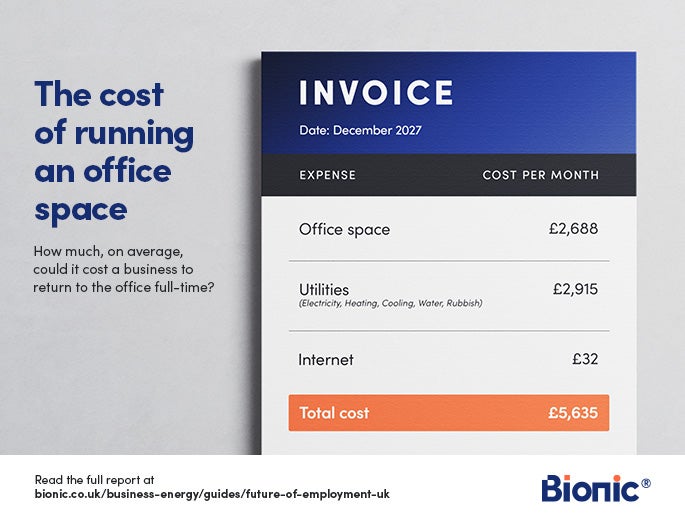
While employees could be spending more than £3.5k if forced to head back to the office on commuting alone, businesses could also see a steep increase in their bills if they choose to bring people back to the office full-time.
Employers could be spending an average of £5,635 a month on running an office space, thanks to rent, internet rates and energy bills.
The most expensive places in the UK to run a full-time office space
| Rank | UK Cities | Average Office Space Cost Per Square 1,000 Foot | Basic Utilities Cost per 1,000 Square Feet PCM | Internet Costs (Average Monthly Cost) | Total Cost of Running an Office Space (per month per 1,000 sqft) |
| 1 | Derby | £847.72 | £92.65 | £34.67 | £975.04 |
| 2 | Milton Keynes | £794.67 | £86.86 | £25.67 | £907.20 |
| 3 | Southend-on-Sea | £677.23 | £74.02 | £25.67 | £776.92 |
| 4 | Stoke-on-Trent | £519.34 | £56.76 | £30.70 | £606.80 |
| 5 | Blackpool | £395.10 | £43.18 | £31.73 | £470.01 |
| 6 | Nottingham | £392.44 | £42.89 | £29.92 | £465.25 |
| 7 | Coventry | £379.82 | £41.51 | £31.83 | £453.17 |
| 8 | Luton | £363.77 | £39.76 | £28.91 | £432.43 |
| 9 | Leeds | £334.70 | £36.58 | £31.73 | £403.01 |
| 10 | Kingston upon Hull | £292.52 | £31.97 | £34.50 | £358.99 |
Derby is the most expensive place in the UK to run a full-time office
According to our data, businesses in Derby are facing office rental costs that are 185% higher than the national average.
With an average monthly rate of £975.04 per 1,000 square feet for rent and an additional £92.65 for utilities such as electricity and gas, Derby's office spaces are now more expensive than those in London.
The cities in the UK with the most empty office spaces
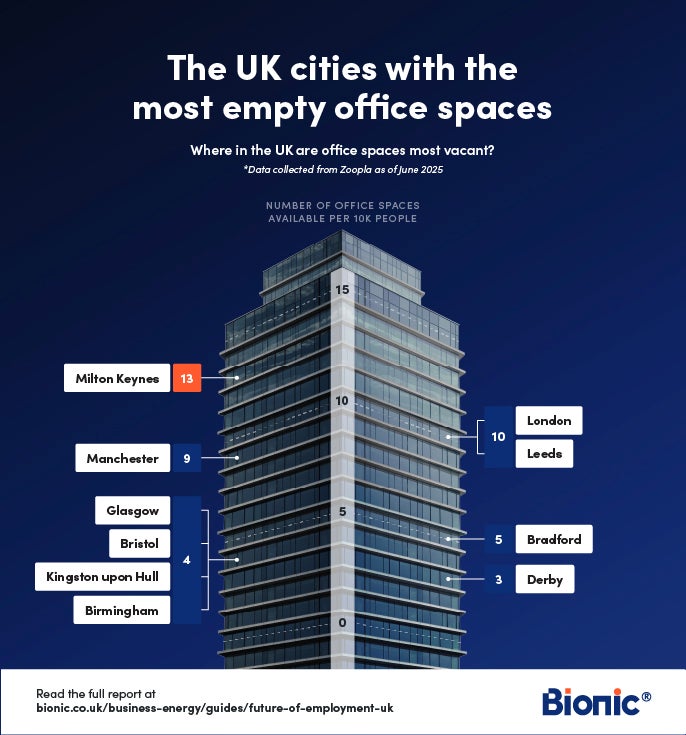
As business owners plan a full return to in-office work, having sufficient office space will be essential to accommodate entire teams. As of June 2025, Zoopla reported 11,092 vacant office spaces available nationwide.
Using data from Zoopla, we were able to see the number of office spaces available in each UK city as a proportion of the population, to find the cities with the most empty office spaces available.
| Rank | UK Cities | Population | Number of Office Spaces Available (From Zoopla as of 11th June 2025) | Number of Office Spaces Available (From Zoopla as of 11th June 2025) Per 10,000 Population |
| 1 | Milton Keynes | 229,941 | 288 | 13 |
| 2 | London | 7,556,900 | 7,294 | 10 |
| 3 | Leeds | 455,123 | 435 | 10 |
| 4 | Manchester | 395,515 | 341 | 9 |
| 5 | Bradford | 299,310 | 137 | 5 |
| 6 | Glasgow | 591,620 | 259 | 4 |
| 7 | Bristol | 617,280 | 250 | 4 |
| 8 | Kingston upon Hull | 314,018 | 124 | 4 |
| 9 | Birmingham | 984,333 | 367 | 4 |
| 10 | Derby | 270,468 | 94 | 3 |
Milton Keynes has the most available office spaces in the UK
With 13 office spaces available per 10,000 people, commercial property in Milton Keynes is the most vacant in the UK.
The cost of running an office in Milton Keynes is £907.20 per 1,000 sq ft a month, which is inclusive of rent (£4,787), utilities including energy bills (£243.17), and internet (£25.67).
Bradford is the best place in the UK to open an office
Bradford makes the top ten list for both the number of office spaces available (5 per 10,000 of the population) and the cheapest office space cost per month, making it one of the best places for businesses looking to push an in-office mandate.
With offices costing as little as £1,086 per month, Bradford business owners could be paying 77% less than the rest of the country.
Compare business running costs with Bionic
Whether you’re currently implementing a full office return within your business or just thinking about one, there are a lot of personal, practical, and logistical issues to consider.
By 2027, it is clear that the majority of the UK workforce will be working in the office more than they are now, but while that change occurs, it is important to think about how a business, including yours, will be affected.
Secure your organisation's financial future by reducing your office’s bills by comparing business energy prices to make sure you get the best deal. Get in touch on 0808 253 7097 to switch business energy supplier or start a quote online today to compare prices.
Methodology
Bionic has utilised Google Trends data to forecast the complete decline of "working from home jobs" searches. This projection indicates the precise date when remote and hybrid work will no longer be standard practice in the UK.
We’ve calculated the cost of a full-time return to the office for both employers and employees using data from Numbeo and Zoopla. As part of the report, Bionic also surveyed 2,000 UK office workers to gauge UK workforce attitudes.








